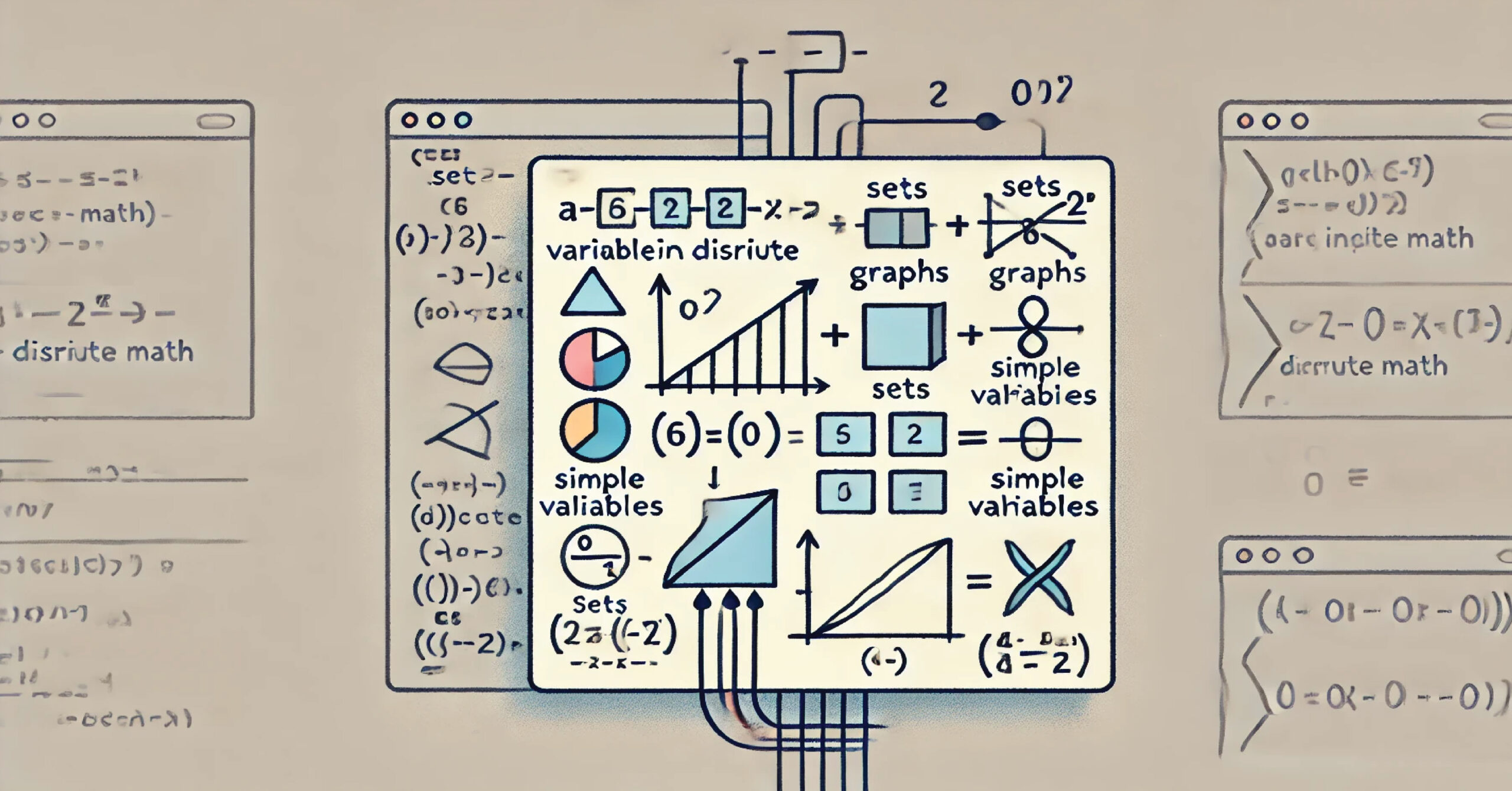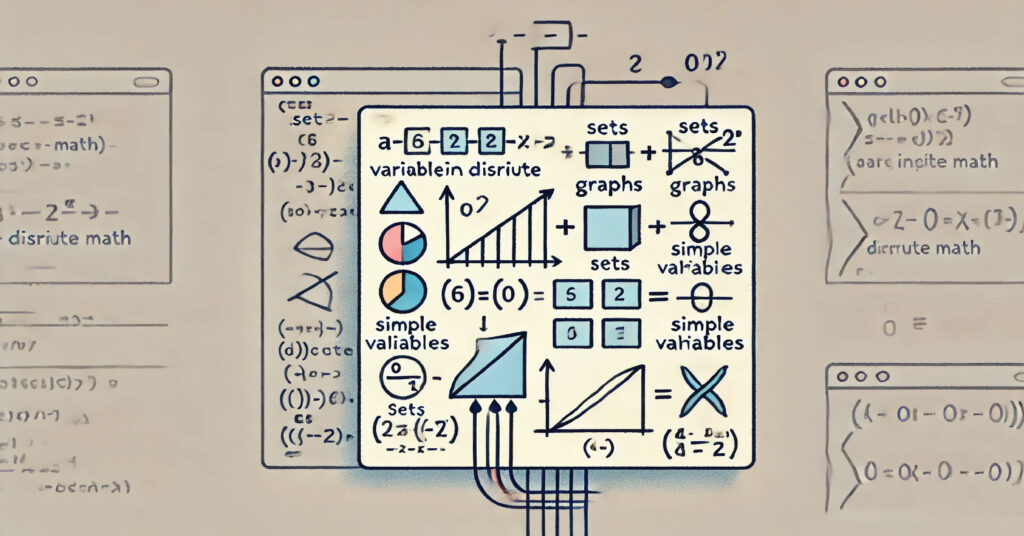Education
How Does Variable Inline Discrete Math Work? Is It Challenging?

- /home/u433845138/domains/buzzark.co.uk/public_html/wp-content/plugins/mvp-social-buttons/mvp-social-buttons.php on line 27
https://buzzark.co.uk/wp-content/uploads/2024/10/Untitled-2-01-4-1000x600.jpg&description=How Does Variable Inline Discrete Math Work? Is It Challenging?', 'pinterestShare', 'width=750,height=350'); return false;" title="Pin This Post">
- Share
- Tweet /home/u433845138/domains/buzzark.co.uk/public_html/wp-content/plugins/mvp-social-buttons/mvp-social-buttons.php on line 72
https://buzzark.co.uk/wp-content/uploads/2024/10/Untitled-2-01-4-1000x600.jpg&description=How Does Variable Inline Discrete Math Work? Is It Challenging?', 'pinterestShare', 'width=750,height=350'); return false;" title="Pin This Post">
Discrete mathematics is the study of mathematical structures that are fundamentally discrete rather than continuous. This means the objects studied in discrete math do not vary smoothly, but have distinct and separate values. Discrete mathematics encompasses topics like logic, set theory, graph theory, and combinatorics, which are critical in computer science and digital logic design. Unlike calculus, where numbers and functions vary continuously, discrete math deals with elements that are countable and distinct.
Quick Bio Table for the Article
| Topic | Description |
|---|---|
| Article Focus | Variable inline discrete math |
| Main Keyword | What is variable inline discrete math? Is discrete math hard? |
| Type of Math | Discrete mathematics, focusing on distinct and countable objects |
| Applications | Algorithms, cryptography, combinatorics, graph theory |
| Difficulty Level | Varies, but can be challenging due to abstract thinking |
| Main Fields | Computer science, digital logic, network theory, cryptography |
| Key Topics | Set theory, logic, graph theory, combinatorics |
| Learning Strategy | Practice proofs, understand definitions, use visual aids, group study |
| Challenges | Abstract concepts, complex problem solving, algorithmic thinking |
| Importance | Foundational for algorithms, cryptography, and efficient programming |
| Career Relevance | Essential for careers in software development, cryptography, data analysis |
What is Variable Inline Discrete Math?
Variable inline discrete math refers to the use of discrete variables that take on distinct values within mathematical formulas and computational structures. In the context of programming or algorithms, these variables often play an essential role in decision-making processes or iterations where the values change based on specific conditions.
Inline refers to how these variables are used directly within the structure of equations or code without requiring extensive external functions or modules. For example, a variable inline could be a mathematical expression placed directly within a loop in a program, reducing the need for auxiliary function calls or external calculations. It streamlines operations and ensures that the discrete mathematics components are integrated directly into the program flow.
Importance of Variable Inline Discrete Math
- Efficiency in Algorithms: Inline variables simplify the design of algorithms by reducing the need for external calls, optimizing space and time complexity. This efficiency is particularly important in areas like cryptography, network algorithms, and artificial intelligence.
- Direct Calculation: By allowing direct calculations, inline discrete variables ensure that mathematical results are computed more efficiently, especially in scenarios involving large data sets or complex graph traversals.
- Improved Readability in Code: Inline variables, when used effectively, can enhance the readability of the code by embedding the mathematical logic directly into the algorithm. However, it also comes with challenges if not implemented properly, making debugging difficult.
- Critical for Computer Science: Discrete math forms the foundation for several fields in computer science, such as data structures, algorithms, and databases. Inline use of discrete math variables can be seen in search algorithms, dynamic programming, and encryption techniques.
Applications of Variable Inline Discrete Math

- Graph Theory: Graph theory plays an essential role in networking, communication systems, and social network analysis. Inline variables are used to define nodes, edges, and paths within a graph, optimizing traversal algorithms such as Dijkstra’s shortest path algorithm.
- Combinatorics: The field of combinatorics, dealing with counting, arrangement, and combination of sets, often utilizes variable inline calculations. For instance, when determining the number of ways to arrange items, inline variables make it easier to compute factorials or other combinations.
- Cryptography: Modern encryption techniques rely heavily on discrete mathematics. Inline variables are used to represent large prime numbers and modular arithmetic in algorithms like RSA and Diffie-Hellman.
- Finite State Machines (FSMs): In computer science, FSMs are essential for modeling sequential logic. Inline variables help in defining the states and transitions in these systems, making the process more efficient.
Challenges of Learning Discrete Math
Is Discrete Math Hard?
The difficulty of discrete math varies depending on one’s mathematical background and familiarity with abstract thinking. For many, discrete math can feel challenging for the following reasons:
- Abstract Concepts: Discrete math is abstract, dealing with objects like sets, graphs, and logic that may not have direct physical analogs. This can be a hurdle for learners who are more accustomed to continuous mathematics (e.g., calculus).
- Logical Reasoning: Success in discrete math often requires strong logical reasoning and proof-writing skills. Topics such as mathematical induction or predicate logic can be intimidating at first.
- Problem-Solving Complexity: Many problems in discrete math involve combinatorial reasoning, which can be tricky due to the large number of possibilities or combinations that need to be considered.
- Algorithmic Thinking: Since discrete math is foundational to computer science, learners are often required to think algorithmically, applying mathematical principles to real-world problems in areas like cryptography or data structures.
Despite these challenges, discrete math can also be incredibly rewarding because of its applications in technology, cybersecurity, and programming.
Tips to Succeed in Discrete Math
- Practice Proofs: A lot of discrete math involves proving the validity of statements. Regular practice with different proof techniques (direct proof, contradiction, induction) is essential.
- Understand Definitions: Ensure you have a strong grasp of fundamental definitions like sets, functions, and graphs. Many advanced topics in discrete math build on these basic concepts.
- Use Visual Aids: For graph theory and combinatorics, drawing diagrams or charts can make it easier to grasp complex relationships.
- Break Down Problems: Discrete math problems can sometimes seem overwhelming. Breaking them into smaller, manageable steps is a useful strategy.
- Group Study: Discussing problems and solutions with peers can enhance understanding. Sometimes, hearing how others approach a problem can provide new insights.
Key Topics in Discrete Mathematics
- Set Theory: The study of sets, which are collections of objects, is a basic building block in discrete math. Operations like union, intersection, and complement are commonly used.
- Logic and Propositional Calculus: Propositional logic involves creating expressions that are either true or false. It’s the foundation for reasoning in computer science, with applications in circuit design and artificial intelligence.
- Graph Theory: Graphs consist of vertices (nodes) connected by edges (lines). Graph theory has applications in network design, social network analysis, and shortest path algorithms.
- Combinatorics: This area deals with counting, combinations, and permutations, essential in fields like statistics, machine learning, and game theory.
- Number Theory: Number theory focuses on the properties of numbers, especially integers. It has applications in cryptography, especially with prime numbers.
- Mathematical Induction: Induction is a proof technique used to demonstrate the truth of statements for all natural numbers. It’s widely used in algorithms, particularly in recursive functions.
- Recurrence Relations: These are equations that recursively define sequences, important in algorithms for sorting and searching.
Why Variable Inline Discrete Math is Essential in Computer Science
Variable inline discrete math allows for more efficient algorithms in programming and reduces overhead in complex systems. Understanding discrete math is essential for fields like software development, cryptography, and artificial intelligence. As technology continues to advance, the need for mastering discrete mathematics becomes even more critical.
Frequently Asked Questions (FAQs)
- What is variable inline discrete math? Variable inline discrete math refers to using discrete variables within mathematical expressions or code to streamline calculations.
- Is discrete math hard? Discrete math can be challenging, especially for those unfamiliar with abstract concepts, but it becomes easier with practice and logical reasoning.
- Why is discrete math important in computer science? Discrete math is fundamental for understanding algorithms, data structures, cryptography, and network theory, all critical in computer science.
- How can I improve my skills in discrete math? Practice proof writing, engage in problem-solving, and make use of visual aids like graphs and diagrams.
- What topics are covered in discrete math? Key topics include set theory, logic, graph theory, combinatorics, and number theory.
Read more Buzzark,

-

 Celebrity11 months ago
Celebrity11 months agoMichael C. Hall: Complex Journey of a Versatile Actor
-

 Business11 months ago
Business11 months agoUnderstanding Apostille UK: A Comprehensive Guide
-

 Technology11 months ago
Technology11 months agoThe Future of Video Marketing: Trends You Can’t Ignore
-

 Celebrity12 months ago
Celebrity12 months agoShane Urban Explained: Facts About Keith Urban’s Sibling
-

 Celebrity12 months ago
Celebrity12 months agoAnuel AA Height and Weight? Everything Age, Bio, Family, and More
-

 Celebrity12 months ago
Celebrity12 months agoWho is Heidi Berry Henderson? Everything About Halle Berry’s Sister
-

 Celebrity12 months ago
Celebrity12 months agoThe Life of Lorenzo Luaces: Lili Estefan’s Ex-Husband Explained
-

 Celebrity1 year ago
Celebrity1 year agoOtelia Cox, Bio Tony Cox’s Wife, Her Age, Height, and Life Journey
-

 Celebrity12 months ago
Celebrity12 months agoian cylenz lee: Bio, net worth, age, family and more Kandyse McClure’s husband
-

 Entertainment1 year ago
Entertainment1 year agoEverything About ‘Oche Oche Anasico’ Lyrics: Meaning, Origin & More
-

 Celebrity12 months ago
Celebrity12 months agoWho is Carolin Bacic? A Deep Dive into Steve Bacic’s Wife
-

 Celebrity12 months ago
Celebrity12 months agoDiscover Nardo Wick’s Age, Net Worth, Biography, Family, and More











